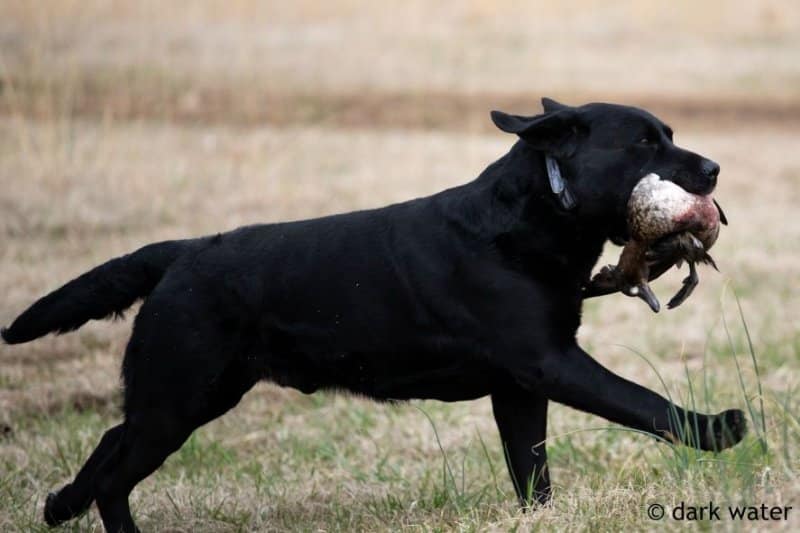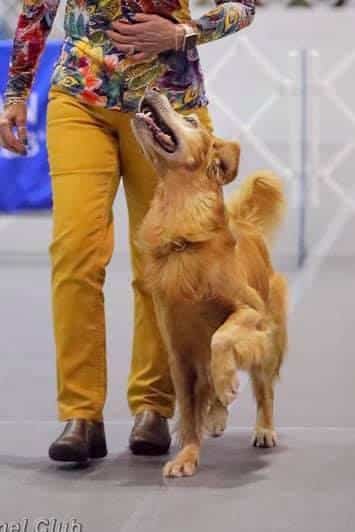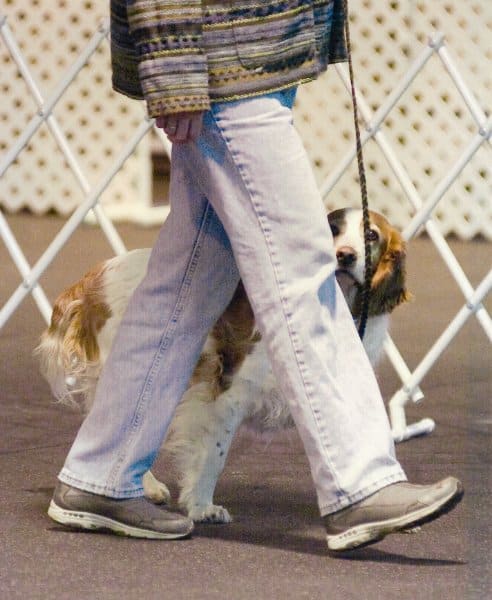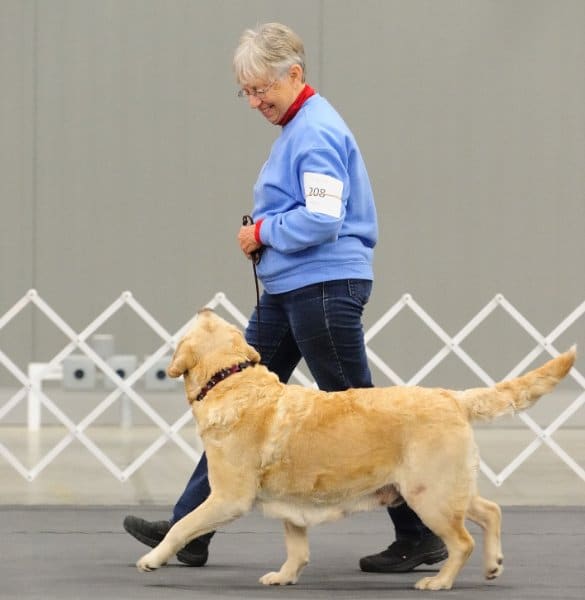
Home » Doing It All – Factors Affecting Performance

To date, we have discussed dogs including their abilities to learn as well as team building. At some point, a dog’s handler begins entering events hoping the dog works as well in the competition as in training—but that doesn’t always pan out. This is a common occurrence with novice handlers or handlers beginning a new sport or starting a new dog’s performance career. What happens when all that training doesn’t seem to transition to trials, tests or shows? What little piece is missing to hold the team together? Here are some ideas to contemplate as one strives to improve performance.
As the leader of the team, the handler’s mood and energy level are often reflected in the dog’s behavior. A recent example that I found on Facebook was posted by Lorie Jolly, an experienced Golden Retriever trainer and exhibitor.
She was disappointed in her dogs at an Obedience Trial after a long layoff, which she assessed as follows:
“First day we were rather flat, but most exercises were ok, just not great. I left thinking ‘what happened?’ The dogs had been training so well. As I thought about it, I realized my usual energy was missing and that Gunny was stressed enough that he jumped up on me on his fronts unless he had something in his mouth. It was MY energy that was missing. I wasn’t the handler that I am in training. I was thinking too much about my handling and I dropped the dog! Sunday, a new me stepped into the ring and the boys did great with our fun factor way up there! Note to self: Train as you show; show as you train!” 1
This is an example of a small nuance that made a huge difference.

When in the ring, everyone feels some stress, energy burst, or excitement, all of which stimulate the production of adrenalin. Dogs can detect the smell of adrenalin on our bodies and our breath. Since handlers are less likely to feel the same stress in training as in competition, the presence of adrenalin scent in the ring would be new and puzzling to dogs. In response, dogs stress up or down (might be way up, right in the middle or way down).
Dogs that stress “up” may become more active and vocal, open to big mistakes in the ring. Those that stress “down” may be incapable of performing. I have watched dogs in the ring (both Conformation and Obedience) that enjoyed quite a romp in the ring when the opportunity presented itself. In my early years, I had a dog that clearly stressed way down, letting me do off-lead Figure 8 exercises by myself because she couldn’t handle my stress levels. She did sit there very nicely, though.

As the leader of the team, the handler’s mood and energy level are often reflected in the dog’s behavior.
Handler miscues are very common and are both verbal and nonverbal. Again, this is fascinating that dogs pay so much attention to the little details that surround performance. I have been guilty of missing a hand signal or doing it differently in the ring (because I was distracted or nervous) which threw off my dog’s response. I have also noted minor things that can distract a dog without me being aware of the miscues I give, such as slipping my hand into my pocket or removing it.
Some things are as simple as a frown rather than the smile used in training. I understand the frown, as the handler may be worried about the dog’s performance, but the dog is just as concerned about that frown. The fascinating thing to me is that this issue even exists in field work where dogs can be quite a distance away from the handler.
I have a dog working on his Master Hunter title that I noticed ran out to his birds just fine, but coming back he trotted slowly, watching me. I didn’t understand his behavior and began studying it. I finally tested a theory I had which was my habit of holding my whistle in my mouth after blowing the come-in whistle command. I dropped the whistle as he was trotting back to me one day and, immediately, he sped up, running all the way back to me. I was amazed that from 80-90 yards away he paid attention to the location of my whistle. Simple, who knew?!

Lastly, lack of proofing may leave a hole in ring-readiness by limiting the dog’s exposure to other settings, distractions, strange dogs, and unfamiliar people, especially that “judge person” in the ring. Dogs do not generalize well, meaning that whatever exercise they perfect in training at the home training site may not be done as well in a new setting.
Therefore, part of ring-readiness includes training at other sites with strangers and their dogs so that you can correct lapses in attention and encourage better focus. Fun matches, training groups, and many types of classes are perfect places to prepare a dog for competition. As the dog acclimates to the performance-like rings and shows less reaction to stress, the handler will have more confidence in the dog and be less stressed when entering competitions.
These practice settings are also a great place to wean dogs from frequent feedback such as praise, petting, or food. Failure to fade these positive bits of information may serve as a distraction for dogs so accustomed to feedback. (“Where’s MY Treat?!”) Not weaning this distraction may undo all the work you’ve done. Yep, it’s that simple in a dog’s mind.

If you find yourself in the same shoes that Lorie was in, or that I have been in, first analyze your situation. Think about yourself and how you were feeling. How does that compare to training settings? How does your dog’s training performance compare to his competition work? What could be causing the difference?
Next, are there any miscues? Not sure? Videotape yourself and study how you are communicating. Is that the same way you do it in the ring? Have someone videotape you in competition and study both tapes. See any differences? Study your dog’s body language, especially in reaction to your cues. See anything you’ve missed before?
Finally, have you done any proofing before entering events? Some dogs are more sensitive and more easily distracted than others, so if your dog is one that needs lots of communication or feedback, you must work on fading his feedback so that he isn’t baffled by your silence or lack of treats.
Oh, and then there’s LUCK, both good and bad. Not a lot you can do to train, proof, or prepare yourself and your dog for the unexpected. It just happens; sometimes its good luck that you capitalize on, other times it’s not. From kildeer attacking my tracking dog, to civil defense sirens going off in the middle of a Master Hunter test, to little kids standing ringside with their hot dogs, one never knows. I think these things are just part of the adventure of showing dogs and making memories that are richer for their uniqueness.
So, in conclusion, do your best under the circumstances. Send your dogs mental notes of love, don’t take things too seriously, and make it fun. He could care less about ribbons, trophies, or titles. All he wants is to play with you, even if you play funny games.
¹Included with permission.
²VCCH OTCH6 MACH POC The Rosehill Connection VCD4 MH UDX9 OGM MXB MJB TKA WCX VCX CCA OBHF (Bridge)
